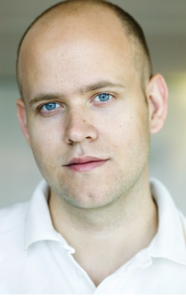
When Swedish entrepreneur and digital hotshot Daniel Ek was 14, he was building web pages for friends using self-taught programming knowhow. And if everything you read on the Internet is true, he charged around £3,500 per job – which isn’t bad for a tween. He even had to recruit a workforce – his classmates. They were able to work on school computers after Daniel Ek persuaded his art and computer teachers of the artistic value of Photoshop. Ek channelled the profits into buying new video games and computer equipment.
Two years later, aged 16, he approached Google who turned him away, citing his lack of a degree as a problem. Fast forward a few years to 2006, and Mr Ek – still missing a degree – was busy selling the rights to his online advertising company Advertigo for over £1.5million. And since every 23-year-old millionaire needs a purpose; he then came up with a visionary plan to create a fully licensed streaming-music service. Together with Martin Lorentzon, Daniel Ek launched Spotify in 2008. It is now a global brand.
Not only did Spotify disrupt the music industry, it also disrupted the online piracy plaguing the music industry. Spotify doesn’t sell music; it sells access to it. To get his service up and running, Mr Ek had to hound the record labels for some time before they agreed to sell him the rights to their songs – in return for a cut of the revenue.
Spotify makes its money from advertising and subscription fees; premium users pay around £7 per month to avoid the ad-breaks that punctuate the free service. Today, Spotify’s estimated worth flutters somewhere between £3 to £6 billion with some experts believing it has outstripped the value of the entire US music industry.
Naturally, like any new business model, Spotify spawned competitors. In 2011, Google launched Google Music, a similar two-tier subscription service. Apple launched iTunes Radio in 2013 – a free music streaming service – in US and Australia, but in January 2016, announced that, apart from its Beats 1 station, all iTunes radio stations would only be accessible by Apple Music subscribers.
Yet, the Spotify phenomenon shows no sign of slowing. In March 2016, it proudly announced its thirty millionth paying subscriber – having gained ten million in just under one year. Its free user base is around twice this number.
Softly-spoken, Daniel Ek is famous for his quasi-religious belief in Spotify – and its role as a force for good in the music industry. But it turns out that for the artists themselves, Spotify is a bit Marmite. Some appreciate the exposure while others resent the miniscule trickle of money from their record labels. Others can’t handle the fact that any of the music is free. Several top artists, including Taylor Swift and Adele have publicly boycotted the service because it refuses to limit access to free users.
Daniel Ek, a keen guitarist, is genuinely passionate about music, He has said that Spotify’s strength stems from doing one thing, and doing it really well. The company’s only focus is making sure the end-user has the best possible music streaming experience. Going fast forward, the tech guru anticipates increased personalised interaction and greater responsiveness from the service.































